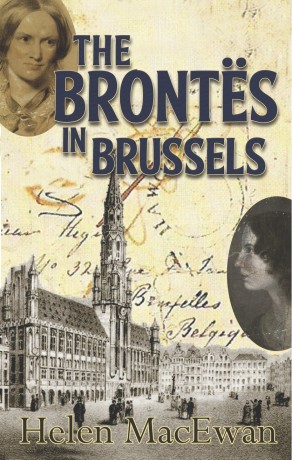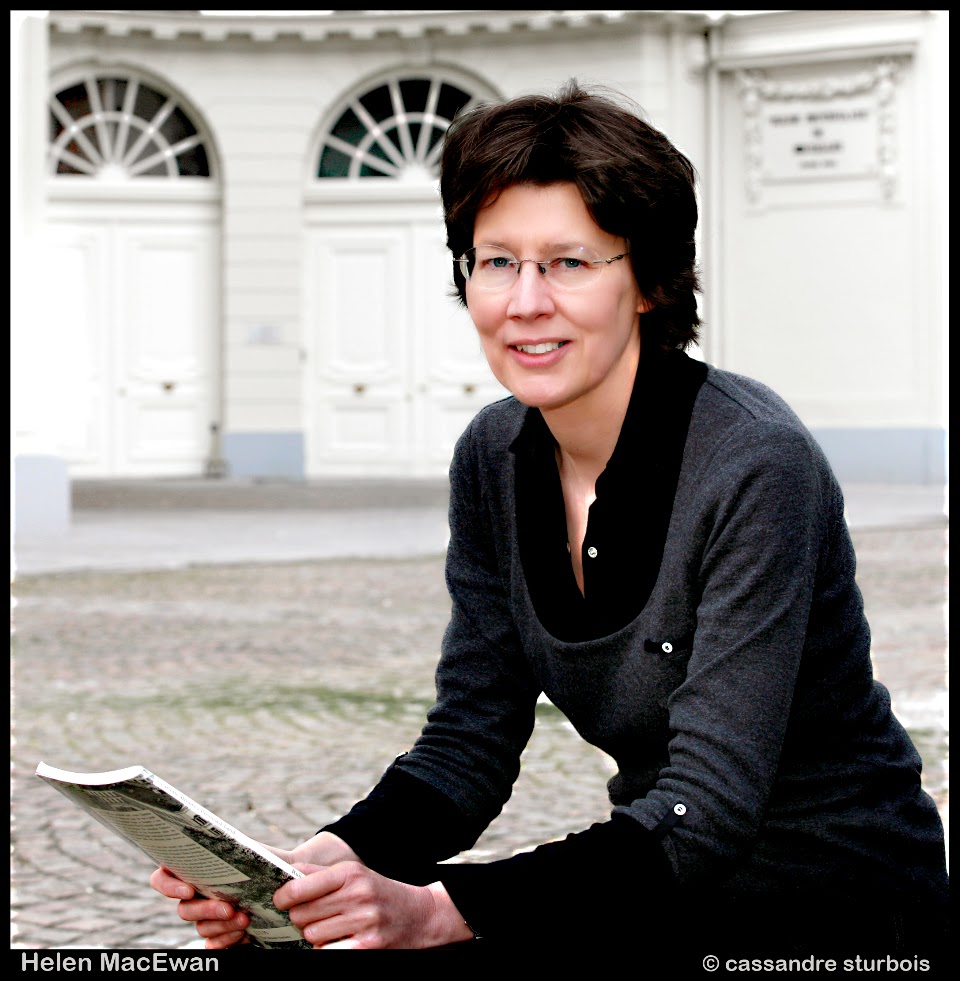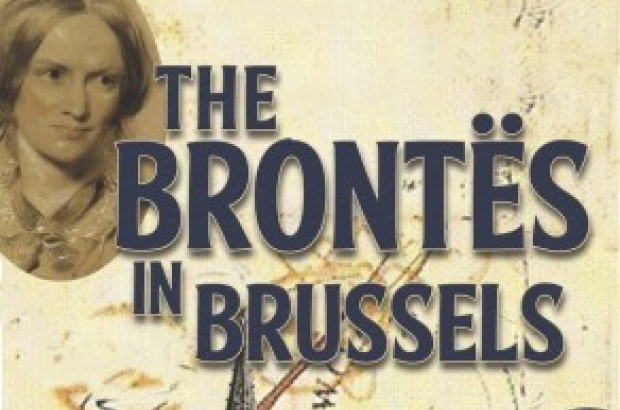- Daily & Weekly newsletters
- Buy & download The Bulletin
- Comment on our articles
The Brontës in Brussels: an interview with author Helen MacEwan
How many tourists in Brussels know that the two most famous Brontë sisters, Charlotte and Emily, lived here for a time? Probably not many, which is a pity as most visitors to the city – whatever their nationality - will have at least heard of the Brontës and many will have read one of their books and/or seen a film of Wuthering Heights.
Helen MacEwan is a British-born writer turned biographer who now lives in Brussels and, like the Brontë sisters, has let the city’s history inspire her writing.
The Bulletin had the opportunity to interview Helen on her second and most recent book, The Brontës in Brussels. The carefully researched work is a complete guide to Charlotte’s and Emily’s stay and show the Brussels they knew. The book is a literary Rick Steve’s – it provides maps, some 90 illustrations and a self-guided tour that enables Brussels residents to recreate and literally walk in the Brontës’ footsteps. The book also includes some of sisters’ own writings and extracts, including four impassioned letters from Charlotte to her married Belgian teacher Heger which caused quite a scandal when they were first published in 1913 and still make startling reading today.

+++
Tell us a little about yourself: Where did you grow up, what did you study?
I’m British but because my family moved about a lot when I was a child I grew up in several different countries – Spain and Ireland as well as Britain. I studied modern languages at university, but I would say English literature has always been my passion, both as a child and adult. Literature, and also literary biography – finding out what my favourite authors were like as people, which experiences formed them.
What brought you to Brussels?
I moved here in 2004 when I got a job as a translator.
How familiar were you with the Brontës and their work before your arrival in Brussels and what got you started down the path of discovering their connections to Brussels?
I was familiar with their novels and had read a biography or two but had never paid much attention to their time in Brussels. I had read Villette at an early age without it really registering with me that Villette was Brussels, as Brussels is never named as such in the novel. What triggered my interest in their time here was re-reading the novel after coming to live here. It led me to want to know much more about Charlotte and Emily’s stay here, and identify the places that were important to them.
How did you come across all this little known information of the Brontës brief visit in Brussels?
In fact their two years here are fairly well documented in biographies of the Brontës, but most general readers who only know the essentials of their lives don’t even know that they were in Brussels. The popular image of the Brontës always focuses on the setting of the parsonage in Haworth and the Yorkshire moors. In Brussels itself the Brontë connection has never been exploited as a tourist attraction. I contacted the Brontë Society in Haworth and found information on the Pensionnat Heger, the boarding school where Charlotte and Emily studied, in a book published by the Society, Eric Ruijssenaars’ Charlotte Brontë’s Promised Land. I then started a branch of the Society here, organising talks and guided walks, and through that met other enthusiasts and scholars based in Brussels. Through them, and information in Brussels archives, I was able to amass more knowledge of the Brontës’ time here.
What makes the love letters Charlotte wrote with her professor so ‘startling’ still today? Is the language of the letters quite vibrant?
They are startling because they are so direct and honest. He was a married man, but not only did she she tell him she needed his friendship and support, she told him that in fact she couldn’t face life without hearing from him. When the tone of her letters became more desperate and insistent he stopped writing and she told him she had become obsessed with him and couldn’t sleep at night, couldn’t bear to think he had withdrawn his friendship. This lack of concealment of her feelings is startling, particularly from a young unmarried woman in the 1840s. The letters have been read in different ways, but many readers have concluded that she was in love with him.
You mentioned that the Brontës had some ‘scathing’ things to say about Brussels from their experiences here. Could you share one of those reflexions with us to give us an idea?
We don’t know what Emily thought about Brussels as none of her letters have survived and she didn’t refer to it directly in her writings. Charlotte was critical of various aspects of her host country and its people while here, but at the same time it’s clear her experience of living abroad stimulated her imagination. Brussels fascinated her, since she used it as the setting for two of her four novels. Certain aspects of the foreign culture repelled and attracted her at the same time. An example is her attitude to Catholicism. She indulged in diatribes against the Catholic church but was drawn irresistibly to go into a confessional in the cathedral one day when she was depressed and persuade the priest to let her confess – which he initially refused to do as she was a Protestant.
Do we see parts of the Brontës’ experiences in Brussels come out in their most famous works?
Charlotte’s The Professor and Villette are the obvious examples. Many of her experiences in Belgium – the character of her teacher Heger, all aspects of her life at the Pensionnat (including her dislike of the headmistress, Heger’s wife), and her excursions and cultural experiences in Brussels, her feelings and moods while here, they are all in there. It’s far less easy to discover any examples in Emily’s writings, but scholars have detected literary influences of her reading while in Brussels, for example of German literature.
Do you have a favourite Brontë? If you could interview one of the Brontës today, who would it be and what would you ask?
Since I like to know all about writers’ lives, the Brontë I feel closest to is Charlotte because I know most about her. In fact I would hardly need to interview her, since she tells us so much about herself in her novels and the hundreds of letters of hers we have, which run to three volumes. However, I would like to ask her what she really felt for Heger, and how she felt in later years about those extremely raw and revealing letters she sent him.
Are there any surviving relatives of the Brontës?
None of the Bronte siblings (there were six in all, but two died in childhood) had any children. Their father Patrick was one of a large family so the Brontës had many cousins back in Ireland, where Patrick came from, who have many descendants today. On their mother’s side, Maria Branwell, there were also cousins who have descendants today.
Are you working on any written works now?
I have ideas for future writing projects. My interest in the Brontës has got me hooked on biographical research, and I’d quite like to write a biography one day. Not a full-scale biography of any of the Brontës, though – there are plenty of good ones already. In the meantime, I will continue to enjoy exploring Charlotte and Emily’s time in Brussels through the events organised by the Brussels Brontë Group.
Brontës in Brussels is available at Waterstones, Sterling Books and other Brussels bookshops (as well as online).




















